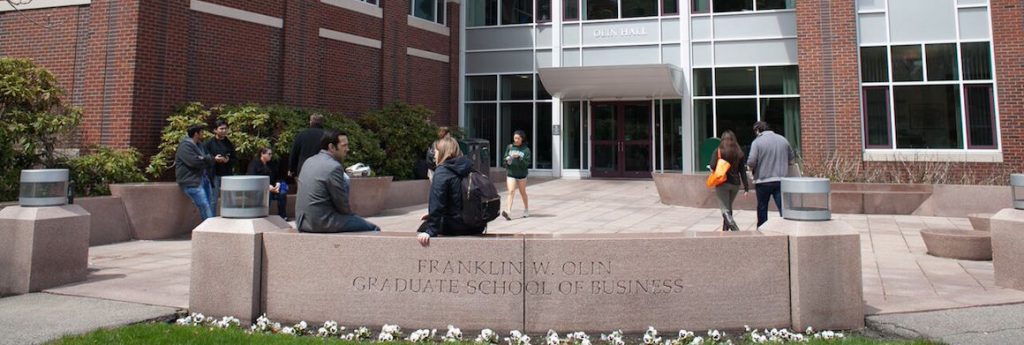Babson Entrepreneurship Stays at #1 for 25 Consecutive Years

For the 25th year in a row, U.S. News & World Report ranked Babson College’s F.W. Olin Graduate School of Business as the number one program for entrepreneurship in the United States. Entrepreneurship is an indelible part of the business school and MBA program, found within the curriculum, faculty, clubs, centers, and more.
Babson’s Entrepreneurship Curriculum
At Babson, the 50-plus faculty members and 30 adjunct entrepreneurs—the largest dedicated entrepreneurship faculty in the world—come together to teach Entrepreneurial Thought & Action®. This methodology is a way to balance action, experimentation, and creativity with business fundamentals. The goal is to empower students to take action on social, economic, and environmental issues to create value. Students are taught to apply ET&A™ in everything from large corporations to running a charity, solving social issues, and starting a business.
In addition, at Babson, there’s the idea that “we are all entrepreneurs,” which falls under the Entrepreneurship of All Kinds® heading. This concept re-imagines entrepreneurship to include all brilliant improvisers, not just startups, venture capital firms, and business incubators. It looks at how every organization can use entrepreneurship to creatively solve problems and adapt to change.
Both ET&ATM and Entrepreneurship of All Kinds® are interwoven into the very fabric of Babson, being taught in every classroom and every topic.
Babson’s Entrepreneurship Focus
Outside of the curriculum and academic philosophy of Babson, entrepreneurship can be found in dedicated centers and other resources. For example, the school is home to the Arthur M. Blank Center for Entrepreneurship, which helps to accelerate the practice of entrepreneurship through mentoring, competitions, events, workshops, and more. This Center is the hub of the entrepreneurial ecosystem.
There’s also the John E. and Alice L. Butler Launch Pad, which hosts two signature entrepreneurship events every year: the Rocket Pitch and B.E.T.A. Challenge both of which bring together students and alumni to compete in business innovation. The Launch Pad is also responsible for the Summer Venture Program, which accelerates the top 15 student ventures at Babson each year.
To gain more in-depth insight into Babson’s entrepreneurial focus, we had the opportunity to interview Keith Rollag, the Dean-Elect of the Graduate School (starting July 1). He was able to talk to us about how Babson has been able to stay as the number one program for entrepreneurship for 25 years as well as what that looks like at the university.
-
How has the Babson MBA managed to maintain the #1 entrepreneurial slot for so long?
There are several reasons; some of it comes from our first-mover advantage. We taught our first course in entrepreneurship in 1967, and created the Center for Entrepreneurial Studies in the 1970’s at a time when entrepreneurship wasn’t really accepted as a separate business discipline. We started the Babson Entrepreneurship Research Conference in 1981 (which continues to be one of the premier conferences for entrepreneurship) and the Price-Babson Symposium for Entrepreneurship Education in 1984, which over the years has taught almost 5000 educators from over 1000 institutions and 80-plus countries how to teach entrepreneurship.
But our #1 ranking is also due to the creation of a Babson community, culture, and curriculum that is built around entrepreneurship. Entrepreneurship has been an important part of our curriculum since the 1980’s, and we’ve built what we think is the largest entrepreneurship department in the world with over 50 full-time and adjunct faculty members.
Entrepreneurship has been a part of our Babson DNA for decades, and we live it as well as teach it. We are constantly updating our curricula, trying new things, building new partnerships, and exploring new opportunities. The term Entrepreneurial Thought and Action is the latest embodiment of this spirit, and it aptly implies the energy and enthusiasm that is an integral part of Babson.
-
Why do you feel that Entrepreneurial Thought & Action is vital to an MBA education?
At its core, Entrepreneurial Thought and Action is all about rapid learning, and in today’s dynamic world of uncertainty, whoever learns fastest wins. We teach our students to know when to learn quickly through analyzing, strategizing, and planning, and when to learn quickly through prototyping, experimenting, interacting with customers. Both are critical for success, but our education and reward systems tend to favor thinking and discussing over acting. We know from the habits of successful entrepreneurs that in times of high uncertainty, action (and the learning that comes from it) is the best way to solve problems and take advantage of emerging opportunities.
In our Babson MBA programs, we help students develop both a mindset and habit of learning through action. This is valuable whether you are trying to lead innovation within large corporations, grow and expand small and medium-size businesses, create new ventures, or simply find new ways to address complex-but-important problems facing communities, regions, and the world.
Learning quickly is a skill that will always be valued by organizations. While markets, technologies, structures, and roles may change, the need for a manager to learn quickly will never go away.
-
What aspect of your entrepreneurship studies/opportunities/focuses would you like to highlight?
We do many things under the broad heading of “entrepreneurship of all kinds.” Students have the opportunity to participate in intensity tracks around entrepreneurship (where they can build their venture while they are getting an MBA), women-led entrepreneurship, social innovation, and technology development. We also have the Butler Launch Pad as well as our highly competitive Summer Venture Program that helps start dozens of ventures (both business and social-focused). And our MBA students have several clubs focused on regional entrepreneurship and host well-attended conferences on United States, Asian, Indian, and Latin American entrepreneurship.
Whether one is considering starting a company or looking to lead ventures within larger organizations, or just wanting to maximize their impact on the world, an entrepreneurial, can-do, action-oriented mindset primes everyone for success.
